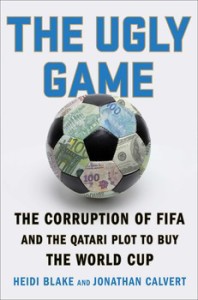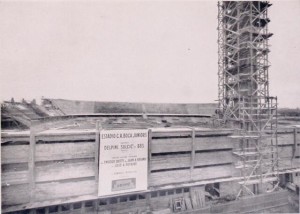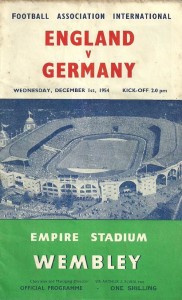Two weeks before the FIFA election to select Sepp Blatter’s successor as president, the Football Scholars Forum, an international group based at Michigan State University, discussed The Ugly Game: The Corruption of FIFA and the Qatari Plot to Buy the World Cup by Heidi Blake and Jonathan Calvert.
Qatar’s successful 2022 World Cup bid and the role of the now-disgraced ex-FIFA ExCo member Mohamed Bin Hammam came under close scrutiny. The authors’ reliance on leaked FIFA electronic files called attention to the challenges and opportunities for scholars working with “big data.” There was discussion about discourses of Western bias and even racism against Africans and Asians (especially Arabs) that are sometimes perceived to be embedded in corruption allegations. Another topic tackled during the event was the intriguing question of whether there should be a universal standard of human rights required for nations to host the World Cup.
The session closed with important contributions related to the upcoming FIFA presidential ballot. Will Sheikh Salman or Gianni Infantino win? And what kinds of reforms might the new leadership deliver? What is the likelihood that any changes introduced will meaningfully transform the structure and governance of the much-maligned world body? In a climate plagued by corruption and cynicism, is there any hope for a better future?
An audio recording of the session is available here.
For more information about the Football Scholars Forum, visit footballscholars.org.
Author: Peter Alegi
 The FIFA special presidential election will take place on February 26 in Zurich, Switzerland. On Thursday, February 11, at 2pm Eastern U.S. time. the Football Scholars Forum will intellectually and spiritually prepare for this momentous event with an online discussion of The Ugly Game: The Corruption of FIFA and the Qatari Plot to Buy the World Cup by British reporters Heidi Blake and Jonathan Calvert.
The FIFA special presidential election will take place on February 26 in Zurich, Switzerland. On Thursday, February 11, at 2pm Eastern U.S. time. the Football Scholars Forum will intellectually and spiritually prepare for this momentous event with an online discussion of The Ugly Game: The Corruption of FIFA and the Qatari Plot to Buy the World Cup by British reporters Heidi Blake and Jonathan Calvert.
The investigative reporting of Blake and Calvert drew extensively on a huge volume of leaked FIFA files they received from a whistleblower within the organization. The book explores the Machiavellian ways in which Qatar won the right to host the 2022 World Cup. The story centers around the actions of now-disgraced FIFA Executive Committee member Mohamed Bin Hammam. The evidence and allegations in the book are striking. In unveiling cash-for-votes schemes and more, the book raises profoundly troubling questions about football governance and the likelihood of the February 26 election yielding meaningful institutional reforms in a post-Blatter FIFA.
For more information about the Football Scholars Forum and to join the February 11 online conversation, email Alex Galarza (galarza DOT alex AT gmail).
Ghana State Funeral for CK Gyamfi
Ghanaian football legend Charles Kumi Gyamfi, who passed away in September at the age of 85, was honored on Friday, December 18th, with an official state burial in Accra.
Gyamfi began his top-level playing career at Cape Coast Ebusua Dwarfs in 1948-49. After one season, he joined Kumasi’s Asante Kotoko, staying until 1954 and then transferring to the Porcupines’ archenemies: Accra Hearts of Oak. In 1960, Gyamfi became the first Ghanaian to play in Germany, with Fortuna Dusseldorf.
After hanging up his boots, Gyamfi returned to Ghana and coached the national team, the Black Stars, winning three African Nations Cup titles (1963, 1965, 1982).
The video above honors the life of one of Africa’s greatest players. RIP CK.
FIFA, Blatter and Me (Andrew Jennings)
Nearly a decade ago, I devoured English reporter Andrew Jennings’s scathing investigation into “The Secret World of FIFA: Bribes, Vote Rigging and Ticket Scandals.”
Now, in a compelling BBC Panorama documentary, Jennings updates the story by digging deeper into FIFA’s most recent and spiraling crisis. The documentary takes viewers to FIFA headquarters in Zurich, and then to the U.S., Brazil, Trinidad, and South Korea.
One of the most interesting revelations in the BBC piece is that the FBI has in its possession potentially damning written evidence alleging that outgoing FIFA President Sepp Blatter has long been aware of the nature and scope of corruption in world soccer.
Another intriguing insight is that Qatar may have paid $117 million to buy votes and win hosting rights for the 2022 World Cup.
In typically relentless and confrontational fashion, the documentary focuses on Jennings’ probe of the ongoing FBI investigation of corrupt FIFA officials and associates from North America, the Caribbean, and Latin America.
He discusses mounting evidence of kickbacks and bribes paid to acquire TV and sponsorship rights—the charges at the heart of the U.S. Department of Justice’s indictment of high-ranking FIFA men, two of whom have already pleaded guilty to racketeering. Several other FIFA Executive Committee members are in the process of being extradited to the United States.
With the Court of Arbitration for Sport’s decision this week to uphold the 90-day FIFA suspension of both Blatter and Michel Platini (head of European soccer body UEFA), it is no wonder that Jennings believes the scheduled February 2016 FIFA presidential election is “descending into farce.”
Rethinking the 2015 Women’s World Cup
On December 1, 2015, the Football Scholars Forum held its 33rd session. The Michigan State University-based online think tank pre-circulated a shared list of readings that formed the basis for a wide-ranging, highly engaging discussion about the impact and aftermath of the 2015 FIFA Women’s World Cup.
Thirteen fútbologists from the United States, Canada, Britain, Argentina, and Lebanon went well beyond the usual focus on the U.S. triumph (its first world title since 1999). The group reflected on the media coverage and scholarly writing about the tournament. Gender discrimination at both FIFA and national FA levels brought out a collective agreement about the dire need for meaningful institutional reform and for much greater funding of women’s football.
Partly reflecting the participants’ interests and expertise, the women’s game in Latin America and the effect of global inequalities attracted considerable attention. Also, the technical, tactical, and physical aspects of the game on Canada’s plastic pitches was scrutinized. Some participants celebrated the individual magic of Marta (Brazil), Necib (France), and Rapinoe (USA) and of teams like Colombia. Others noted the detrimental impact of certain (male) coaches on the games and seemed more critical about the overall playing styles.
I was shocked to learn that in Mexico the most reliable venue for watching Women’s World Cup matches was the local Hooters franchise. Seriously.
In thinking about the aftermath of the World Cup, the group was reminded of the accomplished Australian team that went on strike shortly after the tournament in pursuit of a decent wage. Gaby Garton in Buenos Aires related her experiences of playing in the most recent Copa Libertadores femenina. Her intervention personalized the story of women’s football, past and present: it is not a story of linear progress and perpetual improvement. In fact, it is very much a story of ebb and flow. Clearly, so much work remains to be done, on and off the field.
An audio recording of the session is available here.
Dreaming of a Sports City
 The Football Scholars Forum, the online think tank based at Michigan State University, recently explored fascinating aspects of the long and complex relationship between fútbol and politics in the history of Buenos Aires, Argentina.
The Football Scholars Forum, the online think tank based at Michigan State University, recently explored fascinating aspects of the long and complex relationship between fútbol and politics in the history of Buenos Aires, Argentina.
In its second session of the 2015-16 season, FSF co-founder Alex Galarza, PhD candidate in History at Michigan State, shared a chapter from his dissertation: “Dreaming of Sports City: Consumption, Urban Transformation, and Soccer Clubs in Buenos Aires.” Galarza’s doctoral research has been funded by prestigious national and international grants, including the coveted Fulbright and FIFA Havelange scholarships.
The potential impact of Galarza’s dissertation work beyond the ivory tower of academia can be gleaned from his involvement in an ongoing documentary film project. Working with four young Argentine journalists, Galarza aims to use the format of filmmaking to reveal the “hidden” history of Boca Juniors’ Ciudad Deportiva—a (failed) urban renaissance construction project that sheds new light on the role of professional soccer clubs in city planning and everyday life. (Watch the trailer here.)
The Forum encouraged Galarza to explain how this history of Buenos Aires compares with the experiences of other Latin American cities, and broader processes of modernization and state formation. The author and participants also discussed constructions of race, whiteness, and gender through fútbol, the politics of club governance, and the ideological projects behind stadium construction.
Listen to or download the audio recording here.
 The Football Scholars Forum opened its 2015-16 season on Wednesday, October 14, with a discussion of Christoph Wagner’s DeMontfort University PhD thesis entitled “Crossing The Line: The English Press and Anglo-German Football, 1954-1996.”
The Football Scholars Forum opened its 2015-16 season on Wednesday, October 14, with a discussion of Christoph Wagner’s DeMontfort University PhD thesis entitled “Crossing The Line: The English Press and Anglo-German Football, 1954-1996.”
Based on extensive archival research, “Crossing the Line” analyzes representations of Germany and Germans in English newspapers’ football coverage of key international matches between the two western European nations. Within a shifting post-war historical context, the study notes a persistent undercurrent of hostility in Anglo-German cultural relations, football included.
However, two distinct phases were described. In the first, extending from the 1950s to the rise of Thatcher, dailies generally adopted a restrained tone and their coverage was notable for the “relative absence of anti-German sentiment.” A major transformation occurred in the second phase, from the 1980s to the mid-1990s, as English press coverage turned more negative, chauvinistic, and increasingly xenophobic.
The FSF discussion with the author touched on many different aspects of Wagner’s study, from the militarization of language in the football press and the forging of national stereotypes to narratives of English decline, methodology and sources.
A recording of the session is available here.
For more information about the Football Scholars Forum visit the online think tank’s website.